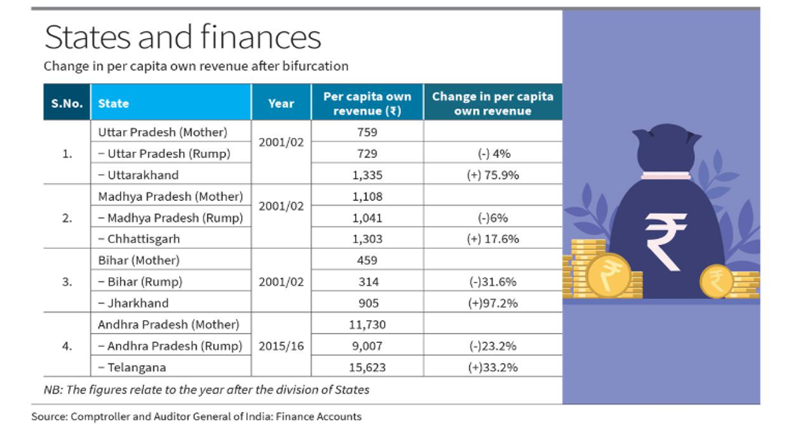Context
- The bifurcation of Andhra Pradesh in 2014, resulting in the formation of Telangana, left the former in a state of deep financial distress.
- This fiscal imbalance continues to haunt the State, as it grapples with structural handicaps and political decisions that have eroded its revenue base.
- The pressing question is whether the Centre, particularly through the Finance Commission, should extend a special financial dispensation to Andhra Pradesh to rectify this imbalance.
- Therefore, it is important to explore the historical context of the bifurcation, the ineffectiveness of current policy responses, and the rationale for a more objective, formula-based solution to restore fiscal equity.
Historical Background and the Demand for Special Category Status
- The genesis of Andhra Pradesh's fiscal distress lies in the 2014 bifurcation, which separated Telangana, and with it, Hyderabad, the economic powerhouse of the undivided State.
- This division stripped Andhra Pradesh of a significant portion of its tax base.
- In recognition of this structural loss, then Prime Minister Manmohan Singh assured Parliament that Andhra Pradesh would be granted ‘special category’ status.
- However, this assurance was not codified in the Andhra Pradesh Reorganisation Act, leaving the State without any formal backing for its demand.
- When the National Democratic Alliance (NDA) assumed power in 2014, Andhra Pradesh’s plea for special status was repeatedly rebuffed.
- The NDA cited the recommendations of the 14th Finance Commission, which advocated discontinuation of the special category designation in favour of a more equitable distribution mechanism across all States.
- Thus, the critical promise made in Parliament remained unfulfilled.
Current Fiscal Challenges and The Problem with Special Category Status Today
- Current Fiscal Challenges
- Now, in 2024, with Chandrababu Naidu returning as Chief Minister, Andhra Pradesh finds itself confronting depleted coffers.
- Years of populist welfare schemes and competitive electoral promises have compounded the fiscal burden.
- While the Centre is not obliged to fund state-level political choices, it does bear responsibility for the structural imbalances created by bifurcation.
- Without significant external support, Andhra Pradesh risks fiscal stagnation, compromising its ability to deliver basic services and pursue development goals.
- The Problem with Special Category Status Today
- While reinstating the special category status might appear to be a straightforward solution, this option no longer carries the benefits it once did.
- In earlier decades, such status came with substantial central assistance through Plan funds.
- ‘Today, it merely offers access to slightly concessional external loans, rendering the designation more symbolic than substantive.
- For Andhra Pradesh, a weakened special category status would offer little financial relief while failing to address the root cause of its fiscal woes.
The Precedent of Fiscal Disparities in State Bifurcations and A Better Alternative
- The Precedent of Fiscal Disparities in State Bifurcations
- The case for such a package is not without precedent.
- Historical data from state bifurcations post-2000 show that newly formed States, Uttarakhand, Chhattisgarh, Jharkhand, and Telangana, have consistently fared better in terms of per capita own revenue compared to their parent States.
- The fiscal impact on the rump States, however, has been uneven.
- While Uttar Pradesh and Madhya Pradesh weathered the split with minimal revenue losses, Bihar and Andhra Pradesh experienced significant declines in fiscal capacity.

- This suggests a rational basis for compensatory packages: when a State’s own revenue declines by more than 10% as a direct result of bifurcation, it should qualify for targeted assistance over a fixed period.
- By this metric, both Bihar and Andhra Pradesh are eligible for special financial consideration.
- A Better Alternative: Special Assistance through the Finance Commission
- A more effective and equitable solution lies in crafting a tailored financial assistance package through the Finance Commission.
- Unlike politically motivated, one-off packages, such as those given to regions like Bundelkhand or Kalahandi-Balangir-Koraput, a Finance Commission-recommended package would enjoy constitutional legitimacy and be grounded in objective analysis.
- This approach would help preserve the integrity of India’s federal structure.
- It would also offer Andhra Pradesh meaningful relief without setting a dangerous precedent of ad hoc central interventions driven by electoral calculations.
Conclusion
- The fiscal plight of Andhra Pradesh is a direct outcome of a structural division over which the State had limited control.
- While political decisions and local governance also play roles in exacerbating the situation, the underlying imbalance created by the bifurcation must be acknowledged and addressed.
- The Finance Commission, as a constitutionally empowered and politically neutral body, is best positioned to deliver an apolitical, formula-driven solution that restores fiscal equity and strengthens India’s federal fabric.
- Ensuring that States like Andhra Pradesh are not left to fend for themselves is not just a matter of policy, it is a matter of national integrity and constitutional responsibility.










